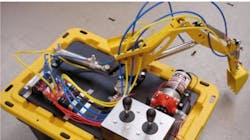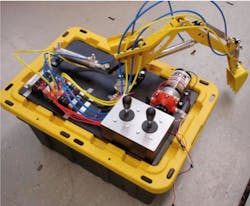CCEFP researchers develop new fluid power training tool
I'm a little bit behind in my news and blog posts but don't want this cool story to slip by without sharing it. I love stories about education and training and anything that helps bring fluid power to life for the non-engineer in me is always a bonus. So this story from the Center for Compact & Efficient Fluid Power (CCEFP) sparked my interest right away.
The Center just announced its researchers have developed and built a micro-excavator, powered by water hydraulics or pneumatics that is small enough to fit in a hand-carried storage bin, which can be used for training, in schools or even in corporate settings. We are working to hopefully have the excavator on display at our upcoming Fluid Power Conference & Expos in Las Vegas and Minneapolis. Hope it comes to pass, I would love to try it out!
As one of the CCEFP’s education and outreach projects, the micro-excavator was built and developed under the direction of Professor John Lumkes at Purdue University. His project team has included a number of his engineering undergraduate and graduate students, most notably Jose Garcia, now a professor at the Illinois Institute of Technology; high school teachers in Project Lead The Way; and the staff of the Minnesota Science Museum. The National Fluid Power Association assisted the CCEFP in providing financial support.
“Based on our extensive field tests with students in and out of school settings, we know that the micro-excavator is an effective hands-on teaching tool that makes it fun to learn about engineering principles while seeing first-hand how fluid power technology works,” says Lumkes.
The accompanying curriculum guide lays out effective strategies for maximizing the teaching power of the micro-excavator. (Teachers involved in the project have assured that this curriculum correlates with education standards and outcomes [Indiana].)
A kit to build a complete, working micro-excavator, either powered by water hydraulics or pneumatics, can be built and readied for classrooms and hands-on displays for approximately $800. The kit includes a water pump, necessary power supplies, hardware (nuts, bolts, etc.), cylinders, valves, tubing, fittings, an excavator arm and a storage case. No special assembly tools are needed; the demonstrator is built using common shop tools (wrenches, screwdrivers, hacksaw and drill).
A construction manual, bill of materials and curriculum guide for students in grades 8-12 are all posted at the CCEFP website (www.ccefp.org).
Lumkes hopes to help teachers and instructors incorporate the micro-excavator into their STEM curriculum and also is willing to work with companies who would like to sponsor these projects and mentor students in using them. He can be contacted at [email protected]. More information can be obtained by visiting the CCEFP website at www.ccefp.org.
About the Author
Mary Gannon
Sr. Associate Editor

Leaders relevant to this article:

